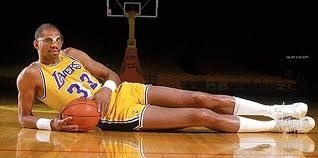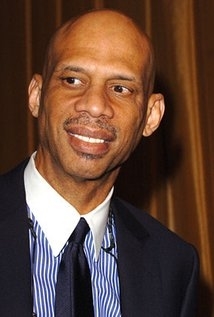 |
| Kareem in High School (http://www.achievement.org/autodoc/page/abd0bio-1 ()) |
Kareem Abdul-Jabbar once said, "You can't win unless you learn how to lose"("Kareem Abdul-Jabbar." Bio). He followed his own advice in his journey to have six NBA championships but more importantly, to be one of the greatest to ever play the game. He was born as Ferdinand Lewis Alcindor on April 16, 1947 (Byrne). Kareem was the dominant center for most of the 1970s and 1980s. His signature shot was the greatly feared skyhook. It helped define the Lakers style of play known as "Showtime". The most shocking decision he made to the public was when he converted to Islam and changed his name to Kareem Abdul-Jabbar, meaning 'generous and powerful servant of Allah' (Cummings). He was scrutinized for his decision as well as being an Islamic African American in a white-dominant society. During his illustrious career, Kareem Abdul-Jabbar achieved numerous feats in the game of basketball, but his devotion and perseverance for what he believed in made him a true American hero.
 |
| Kareem Playing For The Lakers (http://exnba.com/articles-news/documentary-on-life ()) |
Kareem's dedication to supporting African Americans in a time of major racism is what earned him the respect, and hatred of sports fans everywhere. Basketball was becoming popular in the summer Olympics, and with the better players in the league slowly becoming African Americans; the best players in the U.S. were asked to represent America in the 1968 Olympics: "Joining other black athletes, he boycotted the 1968 Olympics because of the discrimination black athletes who has won medals in the 1964 Olympics faced at home. As a result he received a great deal of hate" (Byrne). Because of his dedication to the African American society, he supported the boycott of the 1968 Olympics. He felt black athletes weren't getting the right treatment they deserved. Doing so, he turned down the opportunity to greatly move forward his career by not participating, but because of his beliefs of equality he was fine with making the sacrifice. After Kareem was already established as one of the most dangerous players in the league he felt he needed to make a decision that would forever change his public image: "The day after he won the 1971 NBA championship, he officially changed his name to Kareem Abdul-Jabbar... Abdul-Jabbar later explained that changing his name was his way of acknowledging his beliefs and his family history" (Cummings). Kareem faced criticism for converting into Islam and changing his name but he went through with it anyway. He wanted to acknowledge his family's beliefs and history by devoting his life to the religion of Islam despite the hate he received. Kareem put his beliefs of doing what's right for the African American and Islamic community before his image or the career ahead of him.
Kareem persevered through all the struggles he faced which allowed him to achieve his goals. When playing in college, Kare em surprised those who didn't believe he could become anything big early on: "Shunned by many whites, Abdul Jabbar devoted himself to basketball. In his first season he broke the previous UCLA freshman records for total points" (Byrne). In the beginning of his career Kareem wasn't supported by most white American sports fans, because of the racism at the time. The hate didn't have much of an impact on him. He still managed to become the top college player at the time and ended up being the overall 1st pick in the NBA draft. The average career length for a NBA player is nothing over than ten years but Kareem wouldn't settle for an average career: "Even as he aged, the health-conscious Abdul-Jabbar remained in remarkable shape. Well into his 30s, he still managed to average more than 20 points a game" ("Kareem Abdul-Jabbar."Bio). Kareem played for more seasons than any other professional player at the time. Not only did he play for more years than any other player in the league, but he also managed to keep averaging the amount of points he scored at a younger age. No matter what obstacles Kareem faced, nothing could stop Kareem on his journey to become a legend in the game of basketball.
 |
| Kareem Retired (http://www.imdb.com/name/nm0000717/ ()) |
No matter how the amount MVP or championships titles Kareem won, his dedication to what he believed in, and overcoming all the struggles that were put in front of him is what showed his true colors as an American hero. He never showed any signs of slowing down in his performance whether it's health problems caused by age, or those discouraging him for his religion and race. In an era of serious discrimination, Kareem gave up elevating his career for supporting the African American civil rights movement. Abdul-Jabbar serves as an inspiration to many people because of his dedication to helping others before thinking of himself, and his strong perseverance which lead him to success. Kareem didn't learn to win until he learned to lose. Even when Kareem was losing on the court, it didn't matter because inspiring other to do great things was enough win for him off the court.
Works Cited
Biography.com Editors. "Kareem Abdul-Jabbar." Bio.com. A&E Networks Television, n.d.
http://www.biography.com/people/kareem-abdul-jabbar-9174053 Web. 04 May 2016.
BYRNE, JOHN J. "Kareem Abdul-Jabbar." The Scribner Encyclopedia of American Lives,
Thematic Series: Sports Figures. Ed. Arnold Markoe and Kenneth T. Jackson. New
York:
Charles Scribner's Sons, 2002. Biography in Context. Web. 4 May 2016.
Cummings Jr., Michael D. "Kareem Abdul-Jabbar." Great Lives From History: African
Americans (2010): 4. Biography Reference Center. Web. 2 May 2016.
"Kareem Abdul-Jabbar." Contemporary Black Biography. Vol. 8. Detroit: Gale,1994.
Biography in Context. Web. 27 Apr. 2016.
Page created on 5/21/2016 12:00:00 AM
Last edited 5/21/2016 12:00:00 AM
